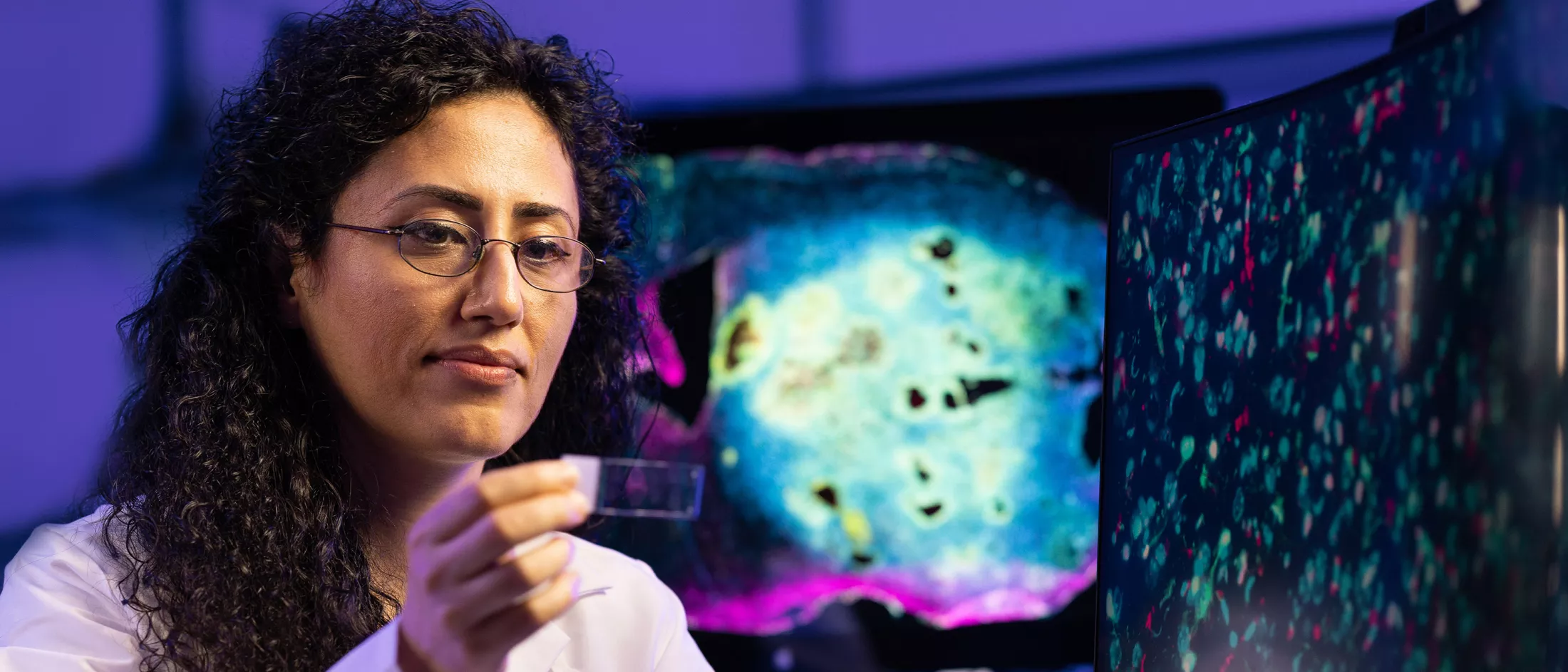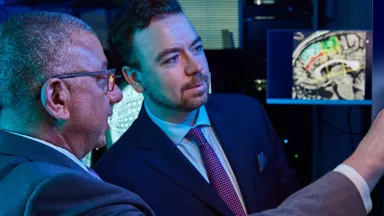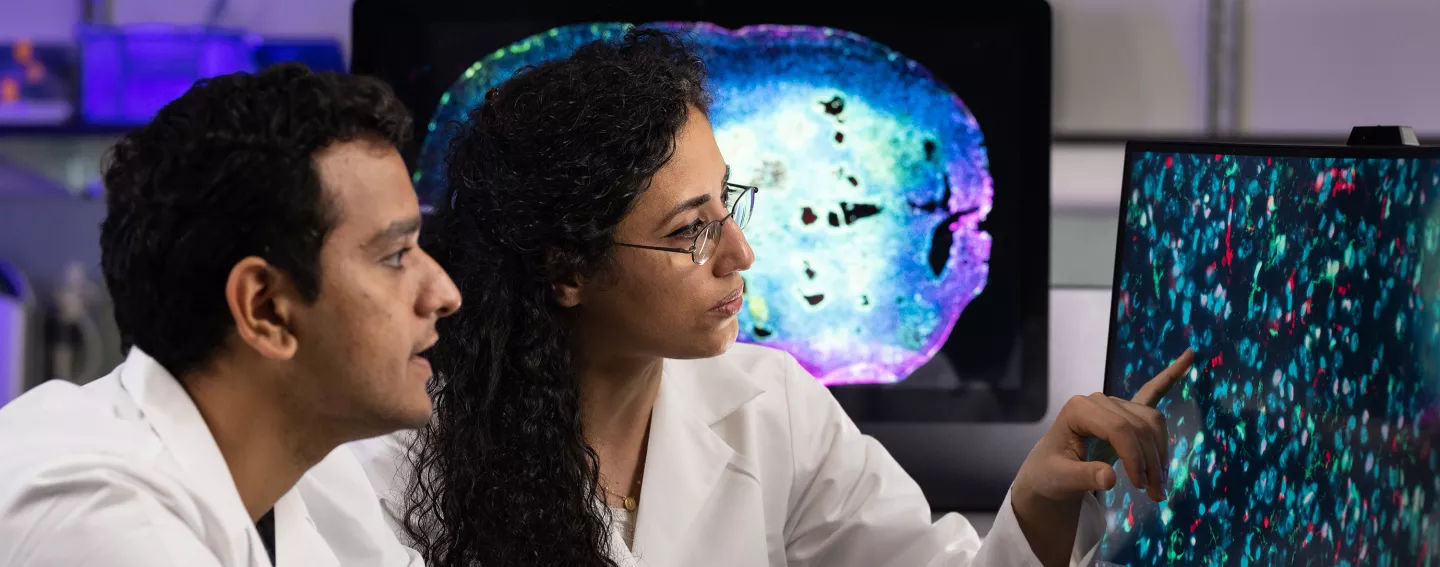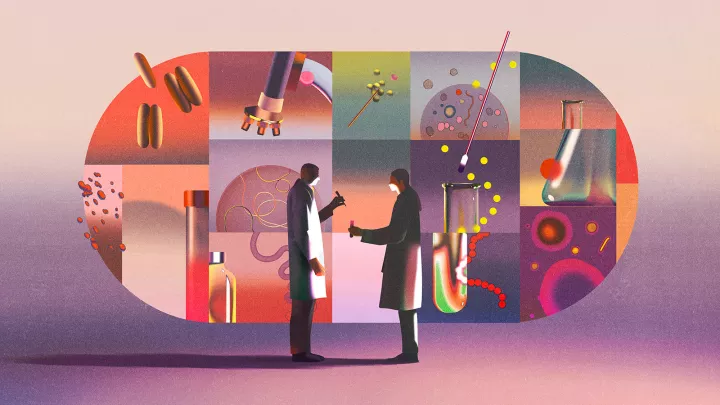Overview
Our aim is to characterize the tumor stroma in glioblastoma (GBM), the most aggressive and treatment-resistant brain tumor. We were the first in the world to report the recruitment of endogenous mesenchymal stem cells (MSCs) in glioma (Behnan et al. Stem Cells, 2014) and to characterize the mesenchymal subtype in GBM patients (Behnan et al. Oncogene, 2017). Our observation indicated that the mesenchymal subtype is divided into two subgroups: one induced by recruited cells and the microenvironment, and another tumor cell per se expressing mesenchymal properties, suggesting that brain-derived MSCs/perivascular cells may be the tumor origin (Behnan et al. Brain 2019; Behnan et al. Oncogene, 2017).

Areas of Concentration
Our particular focus is on understanding the biology of recruited noncancerous cells to the tumor–primarily the immune cells and mesenchymal stem cells/perivascular progenitors in different GBM subtypes–and to define the origin of different recruited cell populations and their interaction with cancerous cells to solve the complexity and heterogeneity of this devastating tumor. Simultaneously, we are working on establishing a translational therapeutic treatment for GBM through combining immunotherapy with other target therapy to change the immunosuppressive microenvironment and eradicate cancer cells. With our extensive knowledge in human glioma stem cells (Behnan et al. Sci Rep, 2016), we aim to establish a drug screening library to test the specificity of drug response among different GBM subtypes. We will be using immune-competent glioma mouse models, transgenic models utilizing different techniques including flow cytometry, confocal microscopy, two-photon microscopy, and low threshold ultrasound. We are looking for collaborative integrative approaches with other investigators to reach innovative treatment and achieve our ultimate goal of developing treatments for brain tumor patients.
Selected Publications
Mondal I, Das O, Sun R, Gao J, Yu B, Diaz A, Behnan J, Dubey A, Meng Z, Eskandar E, Xu B, Lu O.R*, Ho W.S*. PP2Ac Deficiency Enhances Tumor Immunogenicity by Activating STING-Type I Interferon Signaling in Glioblastoma. Cancer Res. 2023 Aug doi: 10.1158/0008-5472.CAN-22-3382. PMID: 37219874.
Hu Y#, Jiang Y#, Behnan J, Ribeiro M.M, Kalantzi C, Zhang M, Lou D, Häring M, Sharma N, Okawa S, Del Sol A, Adameyko I, Mikael Svensson M, Persson O, and Ernfors P. Neural-network learning defines glioblastoma features to be of neural crest perivascular or radial glia lineages. Science Adv 2022 Jun. doi: 10.1126/sciadv.abm6340.
Guo M*, Goudarzi K, Abedi S, Pieber M, Behnan J, Sjöberg E, Zhang X.M, Ernfors P, Harris R.A, Bartek J, Lindström M, Nistér M, Hägerstrand D*. SFRP2 induces a mesenchymal subtype transition by suppression of SOX2 in glioblastoma. Oncogene (2021). doi: 10.1038/s41388-021-01825-2.
Behnan J*, Finocchiaro G, Hanna G. The Landscape of Mesenchymal Signature in Brain tumors. Brain: a journal of neurology 2019 142;4 847-866
Behnan J*, Stangeland B, Langella T, Finocchiaro G, Tringali G, Meling T, Murrell W. Identification and Characterization of New Source of Adult Human Neural Progenitors. Cell Death and Disease (2017) 8, e2991; doi:10.1038/cddis.2017.368.
Behnan J*, Stangeland B, Hosainey SA, Joel M, Olsen TK, Micci F, Glover JC, Isakson P, Brinchmann JE (2017). Differential propagation of stroma and cancer stem cells dictates tumorigenesis and multipotency. Oncogene, 36 (4), 570-584. PubMed 27345406.
Behnan J*, Stangeland B, Langella T, Finocchiaro G, Murrell W, Brinchmann JE (2016) Ultrasonic Surgical Aspirate is a Reliable Source For Culturing Glioblastoma Stem Cells Sci Rep, 6, 32788. PubMed 27605047.
Behnan J*, Isakson P, Joel M, Cilio C, Langmoen IA, Vik-Mo EO, Badn W (2014) Recruited brain tumor-derived mesenchymal stem cells contribute to brain tumor progression Stem Cells, 32 (5), 1110-23. PubMed 24302539.
Fayzullin A, Tuvnes FA, Skjellegrind HK, Behnan J, Mughal AA, Langmoen IA, Vik-Mo EO (2016). Time-lapse phenotyping of invasive glioma cells ex vivo reveals subtype-specific movement patterns guided by tumor core signaling. Exp Cell Res, 349 (2), 199-213. PubMed 27515001
Behnan J, Grieg Z, Joel M, Ramsness I and Stangeland B*. Gene knockdown of CENPA reduces sphere forming ability and stemness of glioblastoma initiating cells. Neuroepigenetics 7, (2016) 6-18
Joel M, Mughal AA, Grieg Z, Murrell W, Palmero S, Mikkelsen B, Fjerdingstad HB, Sandberg CJ, Behnan J, Glover JC, Langmoen IA, Stangeland B (2015). Targeting PBK/TOPK decreases growth and survival of glioma initiating cells in vitro and attenuates tumor growth in vivo. Mol Cancer, 14, 121. PubMed 26081429
Sandberg CJ, Vik-Mo EO, Behnan J, Helseth E, Langmoen IA (2014). Transcriptional profiling of adult neural stem-like cells from the human brain PLoS One, 9 (12), e114739. PubMed 25514637
*Corresponding author
Jinan Behnan, Ph.D.
About Jinan Behnan, PhD
Dr. Behnan has more than 12 years’ experience in high-grade glioma and the mesenchymal signature in GBM. She completed her postdoctoral research in the Ernfors' lab at the Karolinska Institute, Sweden and was awarded a Marie Curie Global Fellowship in 2019. Dr. Behnan obtained her PhD in tumor biology from Oslo University, Norway. She graduated from the Research School in Stem Cell Biology at the Lund University Stem Cell Centre, Sweden, and she earned a master’s degree in biomedicine from Skövde University, Sweden, as well as a bachelor’s degree in biology/biochemistry from Aleppo University, Syria. She has broad expertise in tumor stroma, preclinical trials in immunotherapy, working with epileptic and glioma patient samples and using a variety of techniques, including animal surgery, small animal irradiation, vaccination, flow cytometry, confocal microscopy, and establishing primary cell culture from different human and mouse tissue. Dr. Behnan has been leading projects since 2012 and is the corresponding author on several of her publications. She currently serves as a reviewer for high-impact, peer-reviewed journals, including Brain, Stem Cells, Cancer Research, and Neuro-Oncology. In addition to her lab work, Dr. Behnan has experience in advancing anti-inflammatory and anti-cancer treatments into clinical trials.







